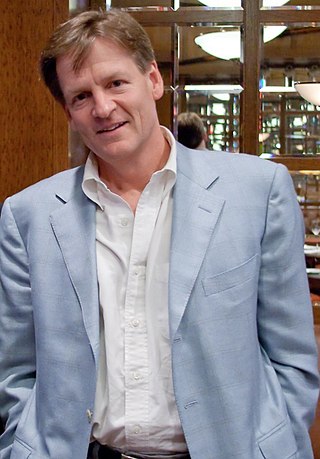
Warner Media, LLC was an American multinational mass media and entertainment conglomerate owned by AT&T. It was headquartered at the 30 Hudson Yards complex in New York City.

Stephen McConnell Case is an American businessman, investor, and philanthropist best known as the former chief executive officer and chairman of America Online (AOL). Case joined AOL's predecessor company, Quantum Computer Services, as a marketing vice-president in 1985, became CEO of the company in 1991, and, at the height of the dot-com bubble in 2000, orchestrated with Gerald M. Levin the merger that created AOL Time Warner, described as "the biggest train wreck in the history of corporate America."

Vanity Fair is an American monthly magazine of popular culture, fashion, and current affairs published by Condé Nast in the United States.

Jeffrey David Sachs is an American economist and public policy analyst who is a professor at Columbia University, where he was former director of The Earth Institute. He worked on the topics of sustainable development and economic development.

Edward Graydon Carter, CM is a Canadian journalist who served as the editor of Vanity Fair from 1992 until 2017. He also co-founded, with Kurt Andersen and Tom Phillips, the satirical monthly magazine Spy in 1986. In 2019, he co-launched a weekly newsletter with Alessandra Stanley called Air Mail, which is for "worldly cosmopolitans". His current net worth is 12 million dollars.
Peter Munk was a Hungarian-Canadian businessman, investor, founder and philanthropist. He was the founder and chief executive officer of a number of high-profile business ventures, including the hi-fi electronics company Clairtone, real estate company Trizec Properties, and Barrick Gold, the world's largest gold-mining corporation.
Gerald M. Levin was an American media businessman. Levin was involved in brokering the merger between AOL and Time Warner in 2000, at the height of the dot-com bubble, a merger which was ultimately disadvantageous to Time Warner and described as "the biggest train wreck in the history of corporate America."

Kara Anne Swisher is an American journalist. She has covered the business of the internet since 1994. As of 2023, Swisher was a contributing editor at New York Magazine, the host of the podcast On with Kara Swisher, and the co-host of the podcast Pivot.

Michael Monroe Lewis is an American author and financial journalist. He has also been a contributing editor to Vanity Fair since 2009, writing mostly on business, finance, and economics. He is known for his nonfiction work, particularly his coverage of financial crises and behavioral finance.
Martin Munkácsi was a Hungarian photographer who worked in Germany (1928–1934) and the United States, where he was based in New York City.
Hachette Book Group (HBG) is a publishing company owned by Hachette Livre, the largest publishing company in France, and the third largest trade and educational publisher in the world. Hachette Livre is a wholly owned subsidiary of Lagardère Group. HBG was formed when Hachette Livre purchased the Time Warner Book Group from Time Warner on March 31, 2006. Its headquarters are located at 1290 Avenue of the Americas, Midtown Manhattan, New York City. Hachette is considered one of the "big five" publishing companies, along with Holtzbrinck/Macmillan, Penguin Random House, HarperCollins, and Simon & Schuster. In one year, HBG publishes approximately 1400+ adult books, 300 books for young readers, and 450 audiobook titles. In 2017, the company had 167 books on the New York Times bestseller list, 34 of which reached No. 1.
William David Cohan is an American business writer.
Walter Chin is a fashion and celebrity photographer of Chinese descent who currently lives and works in New York City, U.S.
The Millennium Villages Project (MVP) was a demonstration project headed by the American economist Jeffrey Sachs under the auspices of the Earth Institute at Columbia University, the United Nations Development Programme, and Millennium Promise with the goal of achieving the U.N.'s Millennium Development Goals in rural Africa by 2015.

Adam Pritzker is an American businessman. He is the chairman and CEO of Assembled Brands, a holding company of fashion and lifestyle consumer brands, and was co-founder and chairman of General Assembly, a private school for professional development. In 2018, General Assembly was sold to The Adecco Group for over $400 million.
Ernő Munkácsi was a Hungarian jurist and writer, general counsel of the Israelite Congregation of Pest, and Director of the Hungarian Jewish Museum. In 1944, during the Nazi occupation of Hungary, he was forced by the Nazis, along with other leaders of Budapest's Jewish community, to serve as secretary for the Hungarian Jewish Council or Judenrat.

Samu Stern was a businessman, banker, advisor to the royal court, and head of Hungary's Neolog Jewish Community from 1929 to 1945.
Thierry Guy Despont was a French architect, artist and designer who lived and worked in New York City.

Béla Berend was a Hungarian Jewish rabbi and right-wing Zionist leader during the World War II and the Holocaust. As a controversial member of the Jewish Council of Budapest, he was accused of collaboration with Nazi Germany during a Communist show trial following the war, but he was acquitted. He emigrated to the United States and took the name Albert Bruce Belton. His personality and activity remain the subject of much debate among historians.
Miklós Szegő was a Hungarian Jewish jurist during the World War II. Following the German invasion of Hungary, he took part in organizing Jewish councils in Central Hungary. As a member of the Jewish Council of Budapest at the last stage of the war, he was arrested and executed by Arrow Cross Party militia in the midst of the siege of Budapest.









